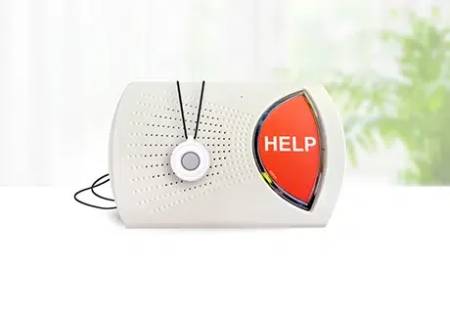Prioritizing Care: An Exploration of The Best Medical Alert Systems for the Elderly IN 2024
In an evolving market filled with numerous options, determining the best medical alert system can be challenging. Here’s a brief overview of the best medical alert system for Elderly, setting the stage for a detailed exploration of their features, pros, cons, and how to choose the most suitable one for your needs.
Best Overall
Best For Active Seniors
Best Mobile System
Best Value
Brio House is an independent review site. We may earn money when you click links inside our site.
Our senior population’s safety and well-being is paramount. Medical alert systems, designed to provide immediate assistance during health emergencies, significantly contribute to this goal. Medical alert systems are life-saving technologies that connect users to emergency help with just a push of a button.
In an evolving market filled with numerous options, determining the best medical alert system can be challenging. Here’s a brief overview of the best medical alert system for Elderly, setting the stage for a detailed exploration of their features, pros, cons, and how to choose the most suitable one for your needs.
What is a Medical Alert System?
A medical alert system, also known as a personal emergency response system, is a device or a set of devices that allow users, particularly the elderly or people with health conditions, to call for help during an emergency. These systems often comprise a wearable device, like a pendant or bracelet, and a base unit that connects to a professional monitoring center or designated caregivers.

Types of Medical Alert Systems: Home and Mobile Systems
There are primarily two types of most medical alert systems – home and mobile devices.
- Home medical alert systems usually require a landline connection and are suitable for individuals who spend most of their time indoors.
- On the other hand, mobile medical alert systems operate on a cellular network, providing coverage wherever there’s cell service, thus offering protection on the go.
How Medical Alert Systems Work
When a user triggers an alert (by pressing a button on their wearable device or base unit or through automatic fall detection), the medical alert system sends a signal to a monitoring center. Trained operators at the center then initiate contact with the user, evaluate the situation, and, if necessary, dispatch emergency services or contact designated caregivers. Some personal emergency response systems also offer GPS tracking technology to locate the user accurately, which is especially useful in mobile systems.

Can an in-home medical alert system work with mobile devices?
Yes, many modern in-home medical alert systems can work with mobile devices. These systems can connect to your smartphone or tablet using various technologies, such as Bluetooth or Wi-Fi.
What are the Best Medical Alert Systems for the Elderly in 2024?
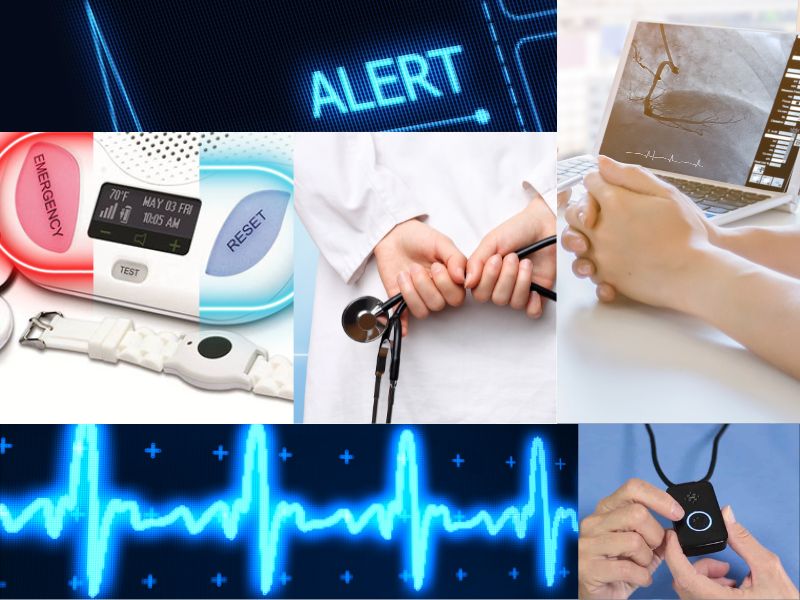
Reviews: The Best Medical Alert Systems for the Elderly in 2024
1. Bay Alarm Medical
Best Overall
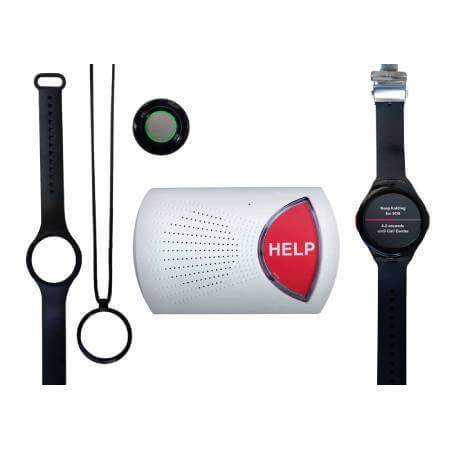
Bay Alarm Medical
Our Rating:

4.8
Bay Alarm Medical devices are trusted systems in the industry, known for its high-quality devices and excellent customer service.
Key Features:
- In-home, mobile, and in-car medical alert systems
- Automatic fall detection
- 24/7 professional monitoring
- GPS location tracking
- Caregiver tracking through a mobile app
- Two-way communication
- Waterproof devices
PROS
CONS
2. Medical Guardian
Best for Active Seniors
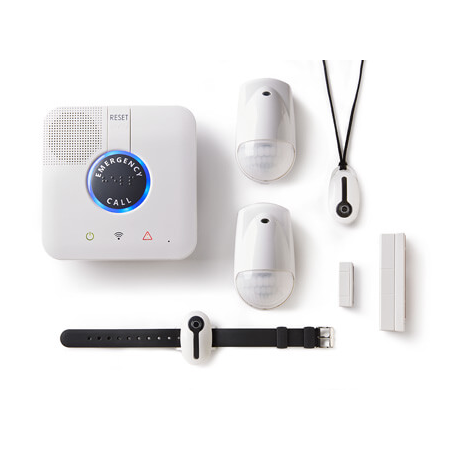
Medical Guardian
Our Rating:

4.7
Medical Guardian is renowned for its cutting-edge technology and flexible options, making it ideal for active seniors.
Key Features:
- Both home-based and mobile systems
- Fall detection technology
- GPS and Wi-Fi location tracking
- Family Guardian app to keep caregivers informed
- Free equipment with subscription
- Two-way communication
PROS
CONS
3. MobileHelp
Best Mobile System
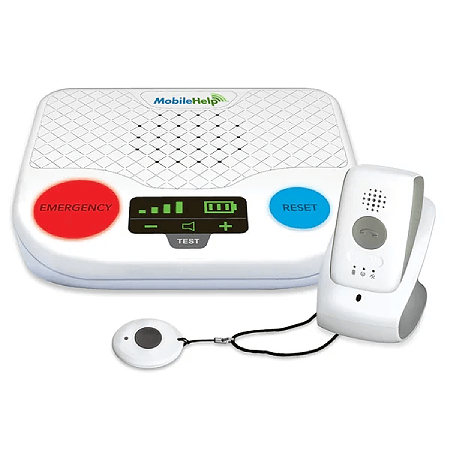
MobileHelp
Our Rating:

4.6
As the name suggests, MobileHelp specializes in mobile medical alert systems, offering robust features and dependable service.
Key Features:
- GPS location tracking
- Mobile and in-home systems
- Fall detection option
- Medication reminders
- No landline required for in-home system
PROS
CONS
4. Medical Alert
Best Value
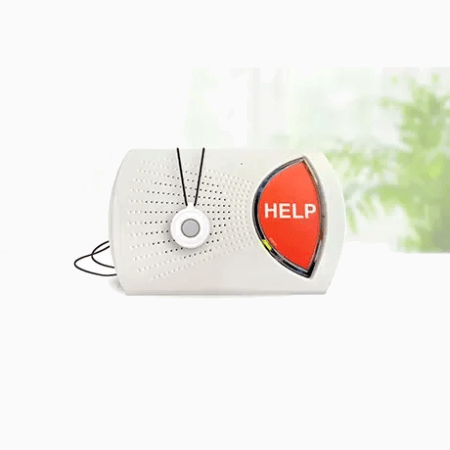
Medical Alert
Our Rating:

4.7
Medical Alert offers a good balance of affordable prices and quality services, making it an excellent value choice.
Key Features:
- Landline and cellular in-home systems
- Mobile medical alert system with GPS
- Fall detection
- 24/7 monitoring
- Caregiver tools with mobile app
PROS
CONS
5. ADT
Best Known Brand
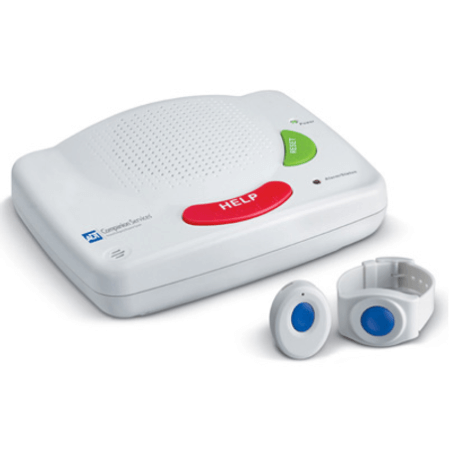
ADT
Our Rating:

4.6
ADT brings its extensive experience in home security to the medical alert industry, offering reliable systems with a strong brand reputation.
Key Features:
- In-home and on-the-go systems
- Fall detection option
- Two-way communication
- 24/7 professional monitoring
- Lightweight, waterproof devices
PROS
CONS
What are the Best Key Features for Seniors?
Automatic Fall Detection
This technology automatically triggers an alarm if it detects that the user has fallen, which can be life-saving, given that seniors may not be able to manually press the help button after a severe fall. The alert will notify the monitoring center or the specified contact immediately, ensuring prompt medical help.
GPS Tracking Technology
GPS technology in medical alert devices helps to accurately locate the user in case of emergencies, especially when they are away from home. It’s particularly beneficial for seniors with memory problems like dementia, as it helps caregivers and emergency responders to locate them quickly when needed.
Mobile Medical Alert Devices
Mobile medical alert devices, such as pendants or wristbands, allow seniors to carry their emergency buttons wherever they go. These devices often come with built-in GPS tracking and fall detection, providing seniors with full protection at home, walking in the park, or running errands.
In-Home Systems
In-home systems usually include a base station and a wearable alert button. They are suitable for seniors who spend most of their time at home. These systems have a large range allowing seniors to move around their houses and yard freely, knowing they can access help if needed.
Optional Fall Detection
Some medical alert systems provide fall detection as an optional feature, which users can choose based on their needs and circumstances. While automatic fall detection is beneficial, it might not be necessary for seniors with good mobility, making this optional feature a cost-effective choice.
Emergency Services Accessibility
A crucial feature of medical alert systems is the ability to quickly and reliably connect users to emergency services. When the help button is pressed (or when a fall is detected), the system should promptly connect the user to a 24/7 monitoring center, which can then communicate the emergency to local emergency services, ensuring timely medical assistance.
Mobile versus In-Home System: Which is the Right Medical Alert System?
When selecting a medical alert system, choosing one that fits the user’s lifestyle, needs, and living situation is crucial. The choice between a mobile system and an in-home system often depends on the user’s level of activity and where they spend most of their time.
In-Home Systems
In-home systems are generally designed for individuals who spend most of their time at home. They typically include a base station that connects to a landline or cellular network and a wearable device like a pendant or wristband.
PROS
CONS
Mobile Systems
Mobile systems are designed for seniors who are more active and often away from home. They utilize a portable device with a built-in speaker and microphone that works over a cellular network.
PROS
CONS
Choosing between a mobile device and an in-home system largely depends on the user’s lifestyle and needs. An active senior might benefit more from a mobile system, while a less active senior who stays at home might find an in-home system more appropriate and cost-effective.
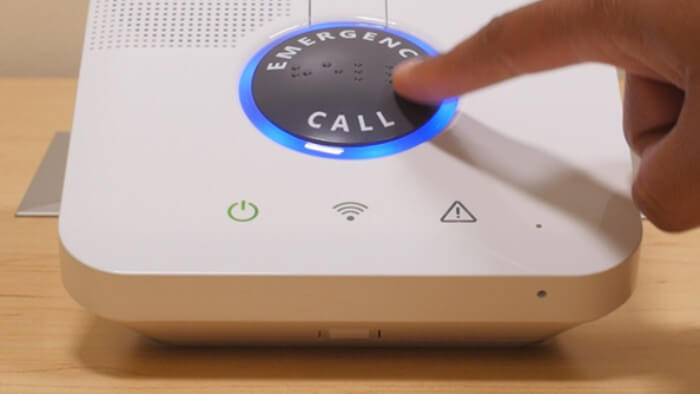
How to Choose the Best Medical Alert System
1. Considerations for Medical Alert System Users
- Medical Alert System Providers: Look for a provider with a good reputation and positive customer reviews. Additionally, verify the provider’s credentials, years in business, and the quality of their customer service.
- Costs: There are three primary costs to consider: Equipment Fees, Activation Fees, and Monthly Costs. These costs can vary widely among providers, so it’s important to understand what each fee covers and if there are any hidden costs.
- Equipment Fees: This is the cost of the medical alert device itself, which can be a one-time purchase or a recurring rental fee.
- Activation Fees: Some medical alert providers charge a one-time activation fee to start the service.
- Monthly Costs: This is the regular fee for the monitoring service, which can vary based on the features included in the package.
- Battery Life: The device’s battery life is crucial, especially for mobile systems. You’ll need a device with a long-lasting battery to ensure constant protection.
- Landline or Cellular Connection: Some systems require a landline to connect to the monitoring center, while others use a cellular network. Decide based on the availability of a reliable landline or cellular connection in your home.
2. Price Lock Guarantee: What Is It and Why It Matters
A price lock guarantee ensures your monthly fee will not increase over time. This can be particularly important for seniors on a fixed income who must budget for their expenses. Not all companies offer this, so it’s important to consider it when considering a system.
3. Exploring Medical Alert System Features
- GPS Location Tracking: This feature helps locate the user in emergencies, which can be particularly useful for mobile system users who often leave their homes.
- Medication Reminders: Some systems offer medication reminders, which can be a useful feature for seniors who take multiple medications throughout the day.
- Wearable Medical Alert Devices: There are typically two types: base units and standalone devices.
- Base units are usually used with in-home systems and require the user to connect within a certain range.
- Standalone devices can be used anywhere and are generally part of mobile systems.
- Caregiver App: Some systems have a caregiver app that allows family members or caregivers to monitor the user’s status, track their location, and receive alerts. This feature can provide the user and their loved ones peace of mind.
It’s important to research and ask questions to ensure you’re making the best choice.
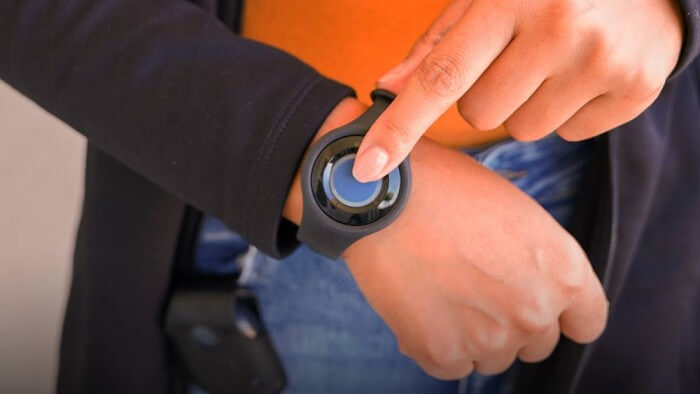
The Role of Monitoring Centers in Medical Alert Systems
How Monitoring Centers Work:
The primary function of a monitoring center in a medical alert system is to serve as a bridge between the user and emergency services. When an alert is triggered, either manually by the user or automatically through fall detection device, the alert signal is immediately sent to the monitoring center.
The trained professionals at the center then establish two-way communication with the user through the system’s base unit or wearable device to assess the situation. Depending on the emergency, the operator can contact family members and caregivers or directly dispatch emergency services to the user’s location.
Emergency Responders: Their Role and Importance:
Emergency responders are lifelines in critical situations. Once alerted by the monitoring center, these trained professionals – paramedics, firefighters, and police – respond swiftly to provide necessary assistance.
Their expertise and quick action can be vital in reducing the potential severity of a situation, from administering first aid to performing life-saving procedures, if necessary. Therefore, a medical alert system’s efficacy relies heavily on the speed and reliability of these emergency responders.
The Speed and Efficiency of Emergency Calls:
The speed at which a monitoring center processes an alert and the efficiency of the subsequent emergency call can significantly impact the outcome of an emergency. Prompt communication with emergency services ensures rapid response times, which can be crucial, especially in life-threatening situations.
Some medical alert systems guarantee that calls will be answered within specific time frames, a feature worth considering when choosing a system. The best medical alert systems will have a proven track record of fast response times, providing peace of mind for users and their families.
The Future of Medical Alert Systems
As technology continues to evolve, so too will medical alert systems. GPS technology and location tracking have already been integrated into many devices, enabling precise location detection in emergencies. This is especially important for active seniors and frequently away from home.
Additionally, the increased reliance on cellular networks over traditional landlines has allowed for more flexible mobile solutions that offer home and on-the-go system protection.
These innovations have significantly improved the functionality and reliability of medical alert devices. GPS technology and location tracking accurately pinpoint the user’s location during emergencies, ensuring that help can be promptly dispatched to the right place. Cellular network reliance has enhanced device portability and made it possible for users to have access to help no matter where they are.
As these technologies continue to improve, we expect to see more advanced features, like health monitoring capabilities, better battery life, and even integration with other smart devices, improving user safety, independence, and quality of life.
Emerging Medical Alert Companies:
Aloe Care Health, Go Medical Alert, Medical Care Alert New companies continue to emerge in the medical alert system market, offering innovative products and services that challenge the status quo.
- Aloe Care Health: Known for its voice-activated system, Aloe Care Health aims to make emergency communication hands-free, making it a great option for those who struggle with wearable devices.
- Go Medical Alert: Focusing on affordability without compromising service, Go Medical Alert offers various packages to cater to different user needs, from a basic in-home medical alert system to an advanced mobile option.
- Medical Care Alert: Offering both at-home and on-the-go solutions, Medical Care Alert prides itself on its highly-rated customer service and no long-term contract requirement.
As technology advances and more companies enter the market, the future of medical alert systems is promising. This competition will hopefully drive innovation, leading to even more effective and user-friendly solutions for seniors and people needing these services.
The Bottomline:
When choosing a medical alert system in 2023, remember the top features such as automatic fall detection, GPS tracking technology, and mobile medical alert devices. Remember to compare costs, including equipment fees, activation fees, and monthly costs, and look for any price lock guarantees.
Additionally, consider the system’s ease of use, battery life, and whether it uses a landline or cellular connection. Finally, ensure the monitoring center has a good reputation for speed and efficiency and that a reputable medical alert company provides the system.
As we prioritize elderly care, the importance of finding the right medical alert system cannot be overstated. A reliable and efficient medical alert system provides peace of mind to the user and their loved ones, knowing that help is available at the push of a button.
With the continued evolution of technology and the emergence of new companies, there is hope for even better, more sophisticated medical alert systems. Let’s keep prioritizing the safety and well-being of our seniors by investing in the best medical alert systems.
